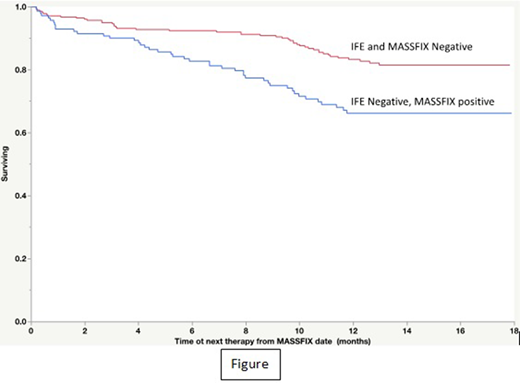Background: The absence of residual monoclonal protein in the serum and urine by IFE using specific antibodies to individual heavy and light chains has been an important part of response assessment and is required for categorizing patients as in complete response. MASS FIX has been shown to be more sensitive in picking up small amounts of monoclonal protein and represents an advancement in the field. Ongoing studies are examining the clinical significance of this increased sensitivity. We designed the following study using clinically obtained test results to examine this question.
Patients and methods: The clinical laboratory at Mayo Clinic changed the process from IFE to MASS FIX in July 2018. We identified patients who had sequential testing before and after this date and collected test results from the last IFE prior to the date of transition and the first MASS FIX after the date of transition. Patients were grouped based on the paired results and outcomes compared between groups. Time to next therapy (TTNT) was defined as the time from the first MASS FIX date to the start of next therapy. Survival was estimated by the Kaplan-Meier method and these curves were compared using log rank test.
Results: Overall, 739 patients with MM, who had a MASS FIX within 12 months of the IFE were studied; 380 (51%) patients had a negative IFE prior to implementation of MASS FIX. These patients had a MASS FIX test performed at a median of 3.7 (0.03-12) months from the last available IFE. The gap between IFE and MASS FIX was <6 months and < 3 months in 71% and 54% of the patients. Among the patients with a negative IFE, 130 (34%) tested positive on the subsequent MASS FIX. Limiting the analysis to those with a MASS FIX within 6 and 3 months yielded 32% in each group that turned positive from previous negative IFE. The median TTNT from the MASS FIX date was significantly shorter for those who became positive on MASSFIX; median was not reached for either group (P=0.002) (Figure). We then limited the analysis to those patients with a gap of <6 months and <3 months between the tests. The results were consistent: P= 0.012 for those with a gap of < 6 months and P=0.01 for those with a gap < 3 months.
Conclusion: The results suggest that the additional sensitivity offered by MASS FIX have clinical significance in patients with MM, given that patients with residual disease identified by MASS FIX have an earlier relapse. The data supports the use of the more sensitive MASS FIX in the laboratory compared to the conventional IFE approaches. The study has the disadvantage that the samples were not tested simultaneously and some of the samples turning positive may reflect an early evidence of relapse, but the relative consistency of the finding irrespective of the gap between the tests argues against that. Ongoing studies are examining MASS FIX on the samples that were called to be negative by IFE initially.
Murray:The Binding Site: Patents & Royalties: Patent Use of Mass Spec to identify monoclonal proteins licensed to The Binding Site. Dispenzieri:Takeda: Research Funding; Celgene: Research Funding; Janssen: Research Funding; Intellia: Research Funding; Pfizer: Research Funding; Alnylam: Research Funding. Kapoor:Cellectar: Consultancy; Sanofi: Consultancy, Research Funding; Janssen: Research Funding; Celgene: Honoraria; Takeda: Honoraria, Research Funding; GlaxoSmithKline: Research Funding; Amgen: Research Funding. Gertz:Janssen: Other: personal fee; Spectrum: Other: personal fee, Research Funding; Springer Publishing: Patents & Royalties; Abbvie: Other; Appellis: Other: personal fee; Annexon: Other: personal fee; Celgene: Other; Amgen: Other: personal fee; Physicians Education Resource: Other: personal fee; Medscape: Other: personal fee, Speakers Bureau; Research to Practice: Other; Sanofi: Other; Teva: Speakers Bureau; Johnson and Johnson: Speakers Bureau; DAVA oncology: Speakers Bureau; Proclara: Other; Aurora Bio: Other; Prothena: Other: personal fee; Alnylam: Other: personal fee; Ionis/Akcea: Other: personal fee. Dingli:Karyopharm Therapeutics: Research Funding; Bristol Myers Squibb: Research Funding; Rigel: Consultancy; Sanofi-Genzyme: Consultancy; Millenium: Consultancy; Alexion: Consultancy; Janssen: Consultancy; Apellis: Consultancy. Lin:Janssen: Consultancy, Research Funding; Kite, a Gilead Company: Consultancy, Research Funding; Takeda: Research Funding; Gamida Cells: Consultancy; Sorrento: Consultancy, Membership on an entity's Board of Directors or advisory committees; Vineti: Consultancy; Legend BioTech: Consultancy; Merck: Research Funding; Novartis: Consultancy; Celgene: Consultancy, Research Funding; Bluebird Bio: Consultancy, Research Funding; Juno: Consultancy. Kumar:Dr. Reddy's Laboratories: Honoraria; AbbVie: Other: Research funding for clinical trials to the institution, Consulting/Advisory Board participation with no personal payments; Carsgen: Other, Research Funding; BMS: Consultancy, Research Funding; Karyopharm: Consultancy; Tenebio: Other, Research Funding; Celgene/BMS: Other: Research funding for clinical trials to the institution, Consulting/Advisory Board participation with no personal payments; Adaptive Biotechnologies: Consultancy; Kite Pharma: Consultancy, Research Funding; Sanofi: Research Funding; Takeda: Other: Research funding for clinical trials to the institution, Consulting/Advisory Board participation with no personal payments; Janssen Oncology: Other: Research funding for clinical trials to the institution, Consulting/Advisory Board participation with no personal payments; Genentech/Roche: Other: Research funding for clinical trials to the institution, Consulting/Advisory Board participation with no personal payments; Merck: Consultancy, Research Funding; MedImmune: Research Funding; Cellectar: Other; Genecentrix: Consultancy; Oncopeptides: Consultancy, Other: Independent Review Committee; IRC member; Amgen: Consultancy, Other: Research funding for clinical trials to the institution, Consulting/Advisory Board participation with no personal payments, Research Funding; Novartis: Research Funding.
Author notes
Asterisk with author names denotes non-ASH members.


